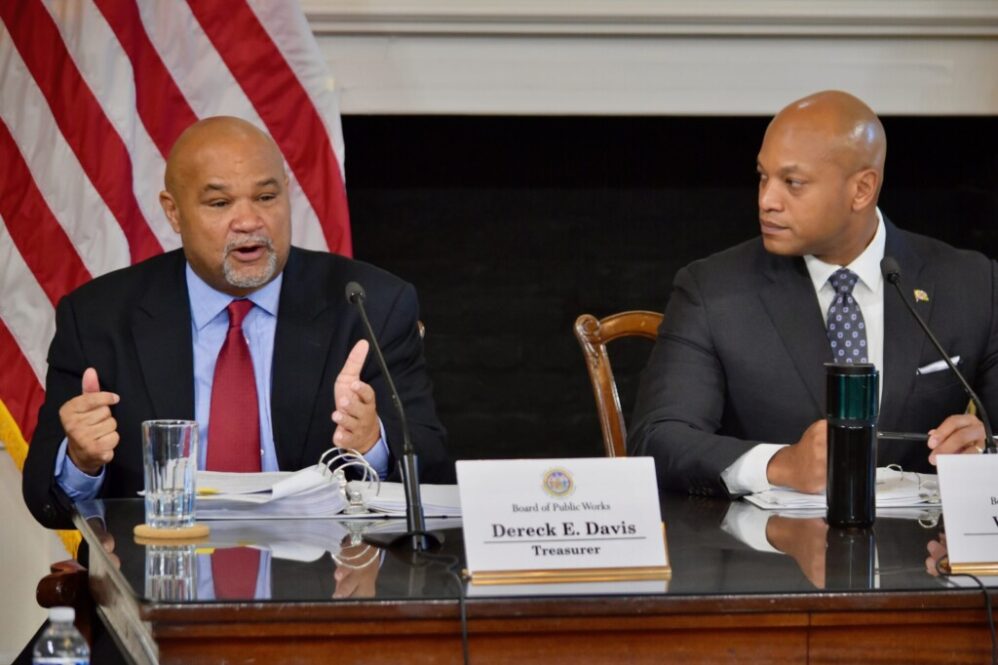MARYLAND MATTERS: The Board of Public Works approved a $635,000 software contract Wednesday despite objections by Treasurer Dereck Davis that the contract failed to meet state diversity requirements.
The emergency contract is needed to support a loan program for federal employees who may be affected by a government shutdown next month.
The board, which includes a woman and two Black members, has stressed the importance of meeting state contractor diversity goals in previous meetings. Davis (D), in comments Wednesday, made it clear that he believes more can be done.
Davis, who has raised similar issues in earlier board meetings, was the lone dissenting vote on the three-member panel that includes Gov. Wes Moore (D) and Comptroller Brooke Lierman (D).
“So, this is me taking the stand now,” Davis said, adding that he was frustrated by repeated claims that officials support the goals “but they fold tent at the first chance.”
“The Board of Public Works, all three members are minorities. All three members. But again, it’s not important enough for us to fight for it the way we might do some other things. So, this is me fighting for it. I will let the governor and comptroller go forward with this worthwhile program. But I can’t support it as is.”
Moore and Lierman voted to approve the contract with Missoula, Montana-based Submittable Holdings Inc. The software company will help the state develop the Department of Labor’s loan program for employees affected by federal government shutdowns.
Following the 35-day shutdown that started in December 2018, the state created a loan program for federal employees who must work during a shutdown but will not be paid. Those employees, as long as their job is based in Maryland, would be eligible for a no-interest loan of $700.
The creation of the program occurred under then-Gov. Larry Hogan (R), who left the office in January. Prior to the contract with Submittable Holdings, the department had yet to establish the program.
“Well, I think a lot of programs that were passed by the General Assembly were not stood up in the last few years,” Lierman told reporters following the meeting.
The state signed the contract in September just as the Republican-led Congress pushed the government to the brink of a shutdown. That crisis was temporarily averted by the passage of a 45-day continuing resolution.
The federal government faces another potential shuttering in mid-November if a deal is not reached.
Davis questioned why the department failed to go back to Submittable Holdings and push the company to meet the requirements in state law.
Labor officials told Davis that the out-of-state company had internal employees to fulfil the contract. Finding subcontractors to meet state goals would have delayed implementation.
“We definitely hear you and your concerns, and I think given the organization of the agency, we take this extremely seriously,” said Jason Perkins-Cohen, deputy labor secretary. “We’re looking at all of our contracts to see where we can strengthen our commitments.”
Davis rejected the argument saying that the company had no interest in meeting inclusion goals.
“This is just how I see it from my nearly three decades down here,” Davis said. “We all say that we support it [Minority Business Enterprise goals] because the law is the law. …But as soon as someone says they have a problem with it … we’re quick to just dismiss it to give a waiver and this has been going on for decades. If anybody says they have a problem, it’s the first thing that goes, the first thing that goes.”
Davis said agencies should approach the goals in contracts as they would if they were fighting for their budgets in the General Assembly.
The treasurer noted that he threatened to rebid a recent contract after a vendor balked at inclusion requirements.
“They just assumed that we wouldn’t go without that contract for the length of time it would take to do a procurement,” he said. “And we said no we’ll send it out to bid. They came back two weeks later and figured it out.”
“This is all one big game of poker and they’re bluffing, and we get bluffed, every single time. Every single time,” he said.
Moore has emphasized the need for the state to do more to include businesses Black, women and other diverse owners, who are under-represented in state contracts.
The governor nodded his head in agreement as Davis spoke. In addressing Davis’ comments, Moore said “I echo your pushing the urgency of this moment.”
The governor did not speak directly to Davis’ comments about the history of how contracts are approved despite failing to meet inclusion requirements. Moore then turned his comments to the looming situation on Capitol Hill.
“It is embarrassing, right, that we would have had to have a conversation about how the state now has essentially been on its own to be able to support the people of our state because of this massive amount of dysfunction that we’re seeing in our Congress,” Moore said.
Following the meeting, a spokesperson said in an email that Moore shares Davis’ “concerns about increasing MBE awards, compliance, and accountability.” She added that executive branch agencies are aware of and committed “to meeting the Governor’s and the Board of Public Works’ expectation that MBE goals are appropriately set based on existing laws, regulations, and policies.”
“Just like it would be unusual for the Comptroller or the Treasurer to reject items from their own agencies, the Governor supports items presented to the Board of Public Works from his agencies,” the spokesperson said in the email. “We are proud of the tremendous progress we have made within the first 10 months of the Administration, and look forward to partnering with agencies and the Board of Public Works to ensure we are compliant with the state’s MBE laws, policies, and procedures.”
Lierman, who has also stressed the importance of increasing diversity in state contractors, called Davis’ comments “really important words.”
Lierman said if the state had met its goals in the previous year, “we would have infused over a billion additional dollars into MBEs [Minority Business Enterprises] throughout the state. ”
“It has to be about business development and creating an economy that’s inclusive of everybody,” said Lierman. “That when we strengthen our MBE goals, and we actually meet our goals, we build a stronger economy for everybody in the state of Maryland.”
Speaking after the meeting, Lierman said there was little choice but to vote for the contract.
“We are continuing to push agencies to meet and exceed their MBE goals,” Lierman told reporters after the meeting. “And but for the dire circumstances in this situation, a situation in which we were both statutorily compelled to stand up this program and under which we need to support Marylanders, we felt like there was no other choice but to move forward with what was presented to us by the Department of Labor.”
Audit highlights ‘brokenness that existed’ in state government.
A recent audit highlighting serious problems at the Maryland Department of Health drew the attention of the governor during Wednesday’s board meeting.
A report released Tuesday by the Office of Legislative Audits found a “pervasive lack of documentation” within the department regarding COVID-19 funds. Auditors found that the agency did not properly monitor how the state used millions of dollars during the public health emergency and identified questionable management of contractors.
“We know that right now we continue to get through news media and through audits, repeated reminders of a level of brokenness that existed within state government,” said Moore. “Fiscal responsibility cannot simply be a buzz word. Fiscal responsibility cannot be something that simply sounds good. It has to be a core part of what we do in state government. That’s the trust that Marylanders have placed in us as we lead the state. The audit that we have read about, it just raises significant concerns about how finances were documented and handled at the Department of Health during the previous administration, under the leadership of the previous secretary.”
Moore made the comments during the discussion of a request by state Health Secretary Dr. Laura Herrera Scott to eliminate 180 contractual positions within her agency. The department will use the savings to create more than 140 full-time state employee positions within the department.
“These 144 positions support a variety of critical functions,” said Herrera Scott.
The new positions touch on several functions of the department including the Medicaid program, behavioral health, issuing of birth and death certificates, and oversight of facilities serving individuals with developmental disabilities, she said.
Herrera Scott emphasized that the move was “budget neutral.”
Moore said the new positions are part of his effort to fill thousands of vacancies within state government. In January, Moore promised to fill half of the estimated 10,000 vacancies in all levels of state government, by the time the General Assembly returns to Annapolis in January.
“Since Day One, it has been an urgent priority for my administration to rebuild state government and to fill thousands of vacancies that exist within our state agencies,” said Moore. The reason they’ve been a core priority is because these vacancies continue to compromise our ability to give the level of service that the people of our state need and the people that our state deserve.”











